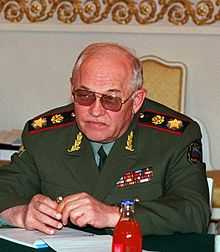Igor Sergeyev
| Igor Dmitriyevich Sergeyev Игорь Дмитриевич Сергеев | |
|---|---|
 | |
| Minister of Defence | |
| In office 22 May 1997 – 28 March 2001 | |
| President | Boris Yeltsin Vladimir Putin |
| Prime Minister | Viktor Chernomyrdin Sergei Kiriyenko Viktor Chernomyrdin (Acting) Yevgeny Primakov Sergei Stepashin Vladimir Putin Mikhail Kasyanov |
| Preceded by | Igor Rodionov |
| Succeeded by | Sergei Ivanov |
| Personal details | |
| Born | Igor Dmitriyevich Sergeyev 20 April 1938 Verkhnye, Ukrainian SSR, Soviet Union |
| Died | 10 November 2006 (aged 68) Moscow, Russia |
| Spouse(s) | Tamara Sergeyev |
| Alma mater | Military Academy of the General Staff of the Armed Forces of Russia |
| Awards | |
| Military service | |
| Allegiance | |
| Service/branch | |
| Years of service | 1955–2001 |
| Rank | Marshal of the Russian Federation |
| Commands | Ministry of Defense of the Russian Federation |
Igor Dmitriyevich Sergeyev (Russian: Игорь Дмитриевич Сергеев) (20 April 1938 — 10 November 2006) was the Defense Minister of the Russian Federation from 22 May 1997 until 28 March 2001. He was the first and (as of 2013) only Marshal of the Russian Federation.
Career
Sergeyev served briefly in the Soviet navy but later transferred to the army, where he spent most of his career in the Strategic Rocket Forces. Sergeyev became commander in chief of the Strategic Rocket Forces in 1992. In this position he was in charge of securing the former USSR's nuclear weapons.
Defense Minister
Sergeyev was appointed minister of defense in 1997 by Russian President Boris Yeltsin. Sergeyev accepted reform within a limited budget under civilian political control. The number of military educational establishments was reduced markedly from their previous levels, which had not changed since Soviet times. A number of army divisions were given "permanent readiness" status, which was supposed to bring them up to 80 percent manning and 100 percent equipment holdings. Sergeyev directed most of his efforts toward promoting the interests of the Strategic Rocket Forces. All military space forces were absorbed into the Strategic Rocket Forces, and the Ground Forces Headquarters was abolished. The Airborne Forces suffered some reductions, while the Naval Infantry only escaped due to their competent performance in Chechnya. Much of the available procurement monies were invested in acquiring new rockets.
In December 1999 Sergeyev called NATO enlargement, in and of itself, a threat to global and European collective security and world politics. He particularly stressed the deployment and use of NATO forces out of area without U.N or OSCE sanction as a threat that devalues confidence-building measures, arms control treaties and security.
Sergeyev was dismissed as defense minister in March 2001 and was replaced by Sergei Ivanov.
Sergeyev died 10 November 2006 from the effects of blood cancer.
Criticism
Sergeyev is blamed by some for not effectively acting during Dagestan War in 1999 but is also praised for the fact that the Russian military captured Chechen capital Grozny in 2000 during the Second Chechen War. However, the ongoing fighting in the south of the republic caused some concern about his efficacy after Vladimir Putin became President.
Honours and awards
- Hero of the Russian Federation
- Order of Merit for the Fatherland;
- 2nd class (28 March 2001) – a great service to the state and significant contribution to the defence of the Fatherland
- 3rd class
- Order of Military Merit
- Order of Honour (20 April 2003) – for services to strengthen national defence and many years of conscientious service
- Order of October Revolution
- Order of the Red Banner of Labour
- Order for Service to the Homeland in the Armed Forces of the USSR, 3rd class
- Order of the Red Star
- Jubilee Medal "In Commemoration of the 100th Anniversary since the Birth of Vladimir Il'ich Lenin"
- Jubilee Medal "Forty Years of Victory in the Great Patriotic War 1941–1945"
- Medal "Veteran of the Armed Forces of the USSR"
- Jubilee Medal "50 Years of the Armed Forces of the USSR"
- Jubilee Medal "60 Years of the Armed Forces of the USSR"
- Jubilee Medal "70 Years of the Armed Forces of the USSR"
- Meritorious Service 1st, 2nd and 3rd classes
- Order "Manas", 3rd class (Kyrgyzstan, December 20, 1999) – for his significant contribution to the development of the Kyrgyz–Russian cooperation in military-technical sphere
- Order Unification (South Korea)
- Order of the Yugoslav Star, 1st class (Yugoslavia, December 23, 1999) – for outstanding contribution to the development of cooperation in building friendly relations between peoples and armed forces of both countries
- Order of Saint Blessed Prince Dimitry Donskoy great (Russian Orthodox Church)
| Wikimedia Commons has media related to Igor Sergeyev. |
| Political offices | ||
|---|---|---|
| Preceded by Igor Rodionov |
Defence Minister of the Russian Federation 1997–2001 |
Succeeded by Sergei Ivanov |
|